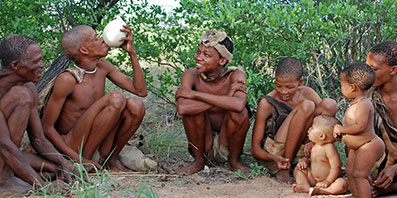
Chewing power affects the brain’s reward center – The Power of Chewing is a slogan used by JAW PEER to emphasize that chewing has many good qualities. Our bodies, mouths, or by all means brains haven’t changed much in the last 50,000 years. This means that we are made to live as hunter-gatherers in the African savannah. Life as hunters and collectors was varied and more physical than we are used to. Our ancestors lived together in groups of 20-80 people and moved between different settlements. They shared the data and probably did not have to work no more than 3-4 hours a day.
The Power of Chewing helped us to survive
Instead of watching TV or surfing the web, a lot of time was spent dancing and socializing in the group. They had primitive knives and arrows, but their mouths were their most important tools. Chewing power was a big advantage. Roots, meat, and nuts were chewed to nourish. Plant fiber, tendons and animal hides were chewed to make utensils and clothing. Therefore, the masseter muscle is the strongest muscle, and enamel the hardest material in the body. When the masseter muscle works, it goes to our reward center.
Chewing power affects the reward center in the brain
Human bite strength and chewing power stand up well in relation to our closest genetic relatives to the monkeys, according to an article in National Geographic. But “The Power of Chewing” doesn’t just refer to the power of the bite. The secret is that chewing power affects the reward center – the Power of Chewing is a source of joy. As a positive spinoff effect, blood flow in the central parts of the brain increases when chewing. Those of our ancestors who liked to chew were rewarded through the selective selection of evolution, which is why the brain secretes a pleasant mix of hormones when we chew. “The Power of Chewing” means that when we chew, we become more alert and at the same time more relaxed. To stimulate our biological nature, we should use our mouth more by chewing. JAW PEER is made to help with this.